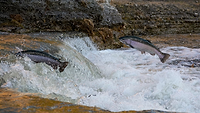Scientist Discovers PFAS-Eating Microbes That Could Clean Contaminated Drinking Water

Image credit: congerdesign via Pixabay
A team of University of California, Riverside (UC Riverside) environmental engineers have discovered bacteria that can destroy certain per- and polyfluoroalkyl substances (PFAS) in contaminated drinking water. The discovery was spearheaded by Yuji Men, M.S., Ph.D., Associate Professor at UC Riverside’s Chemical Environmental Engineering Department.
The “forever chemical”-eating microbes belong to the genus Acetobacterium, and they are commonly found in wastewater environments throughout the world. Through their research, the UC Riverside engineers discovered that Acetobacterium are capable of breaking the strong carbon-fluorine chemical bonds that make up PFAS, a process known as defluorination. These fluorine-to-carbon bonds cause PFAS to persist indefinitely in the environment—earning them the name “forever chemicals.”
The first known bacterium capable of reductive defluorination of PFAS structures, Acetobacterium were found to be effective in defluorinating unsaturated PFAS compounds only, which have double carbon-to-carbon bonds in their chemical structures. Specifically, the study demonstrated the ability of Acetobacterium to defluorinate an unsaturated perfluorinated compound, E-perfluoro-4-methylpent-2-enoic acid (PFMeUPA).
Importantly, the scientists identified the specific enzymes in Acetobacterium that give them their ability to cleave carbon-fluorine bonds. Further research to understand the mechanism by which the enzymes work to defluorinate PFAS may lead to the uncovering of molecularly similar enzymes that are also effective against PFAS carbon-fluorine bonds. The finding also opens the door for bioengineers to improve the key enzymes so they can be effective on other PFAS compounds.
The recent discovery builds upon progress achieved through previous research, in which Dr. Men identified two different bacteria species—Desulfovibrio aminophilus and Sporomusa sphaeroides—capable of separating the carbon-chlorine bond in chlorinated PFAS compounds. Cutting the carbon-chlorine bond triggers substantial spontaneous defluorination and destroys the group of pollutants.
Another prior study led by Dr. Men demonstrated selective biodegradability of fluorinated carboxylic acids (FCAs)—an important class of PFAS—by targeting carbon-carbon bonds. The sum of Dr. Men’s work in this area has furthered the burgeoning scientific understanding of how microorganisms can be used to clean up PFAS.
The use of microbes have historically been used to clean up industrial pollutants like oil spills or the solvent trichloroethylene (TCE). Although relatively little is known about destroying PFAS with bacteria, Dr. Men’s work shows promise. Biological pollution remediation is generally less costly and more environmentally friendly than chemical treatment, and pollutant-eating microbes can also be injected into difficult-to-reach locations underground. By treating PFAS-contaminated groundwater with microbes, microorganisms can destroy pollutants before the water reaches wells. The process involves injecting groundwater with the preferred bacteria species and nutrients to encourage growth of the microbe.
Looking for a reprint of this article?
From high-res PDFs to custom plaques, order your copy today!






